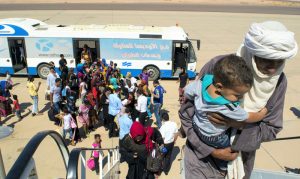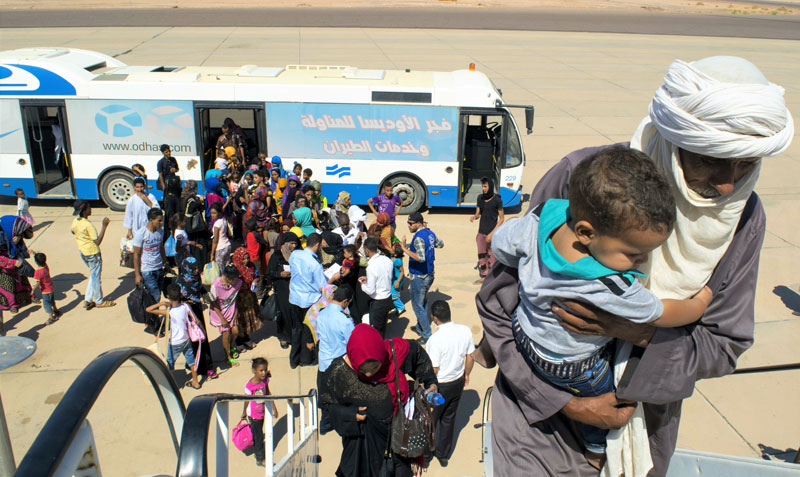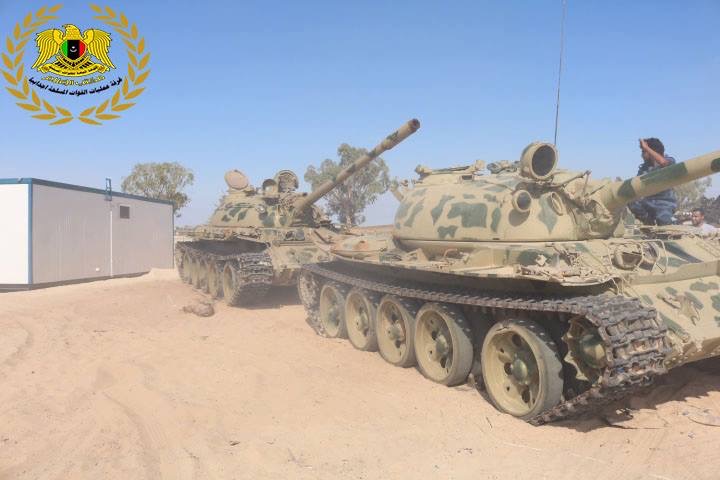By Sami Zaptia.

London, 11 September 2016:
The International Organization for Migration (IOM) reported that it had repatriated 171 stranded Nigerien migrants back to Niger from Southern Libya.
It said that it had organized its first humanitarian repatriation charter flight from southern Libya on 6 September, flying 171 stranded Nigerien migrants (including 76 women and 39 children) back to Niger.
The flight departed from Taminhint Airport – 30 kilometres from the city of Sabha and 750 kilometres south of Tripoli – and arrived in Niamey, Niger.
The IOM said that the repatriation was conducted in close co-operation with the Embassy of the Republic of Niger in Tripoli, the Consulate of Niger in Sabha, the municipal council in Sabha, the Libyan Red Crescent in Sabha and the Libyan Department for Combatting Illegal Migration (DCIM).
The operation was funded by the UN Central Emergency Response Fund (CERF) and the Kingdom of the Netherlands.
The group of repatriated Nigeriens included six medical cases – two with visual impairments and four with high blood pressure. They included 57-year-old Aminata from the Nigerien Tuareg tribe. She had arrived in Sabha in 1993 together with her five children, two of whom later died during the tribal war between the Tabu and the Tuareg that ended earlier this year.
“War took two of my sons, destroyed our house and caused my health problems but until now I could not return to Niger because of my tribal affiliation and the lack of the necessary money to pay for our return,” she explained to IOM. “This trip provides me and my family with a new beginning. We will at least be safe!”
The IOM reported that many of the returnees on the flight expressed similar experiences that their tribal affiliations prevented them from returning home by land because of the conflict which spread along the road between Sabha and the border with Niger.
The charter flight came at a time when many of the stranded Nigeriens in the south had been suffering from poor conditions with limited access to health services due to the limited resources in the south of Libya, the IOM report said.
Hassan, a 47-year-old father of three, used to work as a farmer in Sabha but had in recent times been robbed twice by armed gangs. “I lived in constant terror,” he explained. “I look forward to returning to my country and searching for a new job and finding a safer environment for me and my kids.”, the IOM report quoted him as saying.
Nadia, a 52-year-old mother and widow, lived with her two divorced daughters and their children in Sabha since 2009. One of her daughters worked as a maid to secure some income. At one point she was close to being kidnapped by a gang but was saved in the nick of time. That’s why, explained Nadia, they had now decided to return home to be safe.
Considering the security, economic, tribal and humanitarian situation in the south of Libya, this latest repatriation is different from the several others facilitated by IOM from Mitiga airport in Tripoli, explained IOM Libya’s Operations Team Leader Kamal Al Sherif. “Despite all the challenges, this group of migrants is very lucky. Ten minutes after the flight departed, the whole region was blacked out when there was an extensive power cut.”
Before departure, all migrants received counselling, fit-to-travel medical check-ups and a hot meal. In addition, a mobile patrol from the Sabha Security Committee escorted the buses to Taminhint airport.
The repatriated migrants were received by IOM Niger at the Niamey airport and were provided with cash grants upon arrival to assist with their onward travel to their respective communities. Of the group, 21 were allocated to reintegration assistance to facilitate their socio economical reinsertion back in Niger. The assistance will be provided by IOM Niger, the report said.








